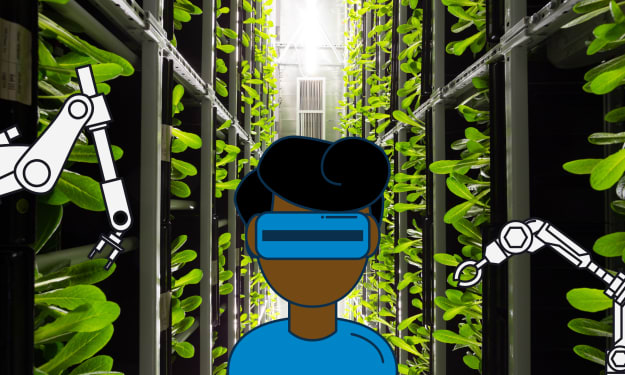Eshan Samaranayake
Bio
Exploring how biotech, food tech, alternative proteins, and business can help develop a sustainable world 🌏 https://linktr.ee/eshan.s
Stories (26/0)
Caterpillars as Bioreactors for High-Quality Protein Production
Cocoon Bioscience, the Madrid-based company just raised $15.9 million to grow its high-value proteins business. What’s the big deal? They are not your typical protein business that uses steel bioreactors, they use caterpillars as bioreactors.
By Eshan Samaranayakeabout a year ago in Feast
Better Bioeconomy Weekly — Mar 27th 2023 🌏
Exploring the intersection of biology, technology, and business in creating a sustainable food system. The purpose of this weekly newsletter is to keep you informed on the developments and innovations in the field and how they can be used to create a better future for all.
By Eshan Samaranayakeabout a year ago in Earth
Using Plants as Bioreactors to Revolutionize Protein Production
Molecular farming is a technology that involves engineering plants to produce desired ingredients such as proteins. This approach to protein production has been gaining traction in recent years with several companies emerging in the space in the past few years.
By Eshan Samaranayakeabout a year ago in Feast
The Future of Agriculture Is Vertical: 6 Benefits You Need to Know
Our current food system is facing multiple challenges that could have catastrophic consequences for the planet. Climate change is one of the most critical obstacles, as conventional agricultural practices contribute significantly to greenhouse gas emissions and weather fluctuations that can harm crop production.
By Eshan Samaranayakeabout a year ago in Earth
3 Sustainable Practices That Can Benefit Your Business and the Planet
1. Implement energy management strategies There are some methods and technologies that businesses may adopt to curtail their energy usage. For instance, let’s consider a boutique retail outlet that specializes in fashion apparel and accessories. One option for the store is to switch to LED lighting throughout the premises. This switch would result in decreased energy consumption and lower maintenance costs, given that LED lights are more durable than traditional incandescent bulbs. Another strategy could be to install programmable thermostats that can automatically adjust the temperature and reduce energy consumption during non-business hours or when the store is vacant.
By Eshan Samaranayakeabout a year ago in Earth
Why Plant-Based Milk Is Better for the Environment Than Dairy Milk
The impact of dairy production on the environment is a major concern due to the large amount of land, water, and energy required to maintain a dairy herd. This article explores the environmental consequences of dairy farming, such as deforestation, water usage, pollution, and greenhouse gas emissions. The adoption of plant-based milk production practices can play a crucial role in mitigating the environmental impact of dairy farming.
By Eshan Samaranayakeabout a year ago in Earth
5 Reasons Why Food Tech Startups Should Not Partner With Industry Giants
1. Limited control and flexibility Startups that partner with larger firms run the risk of having limited control and flexibility. The established procedures and priorities of the larger organizations may hinder the startup’s capacity to make decisions and contribute, creating difficulties for them to reach their full potential and create substantial value.
By Eshan Samaranayakeabout a year ago in Feast
How Food Upcycling Can Combat Environmental Degradation and Food Insecurity
The environmental, social and economic impact of food waste Food waste is a pressing issue that carries severe environmental repercussions. Around one-third of all food produced globally goes to waste, which adds up to roughly 1.3 billion tons annually, costing a staggering US$1 trillion.
By Eshan Samaranayakeabout a year ago in Feast
6 Reasons Why Food Tech Startups Should Partner With Industry Giants
1. Gain access to established supply chains Securing reliable and high-quality ingredients is one of the biggest challenges for startups in the food industry. However, partnering with established food companies can provide a solution to this problem. By leveraging the established supply chains of incumbent companies, startups gain access to valuable resources and expertise that can help them grow and scale their business.
By Eshan Samaranayakeabout a year ago in Feast
4 Ways Food Tech Is Making the Food Industry Better
1. Improved efficiency Food tech has played a crucial role in streamlining the food production process, from the farms to the consumers. By leveraging advanced technologies such as AI and machine learning, we can collect and analyze vast amounts of data, allowing us to identify inefficiencies and optimize the entire production process. This has led to a decrease in food waste and production costs, resulting in more affordable food for everyone.
By Eshan Samaranayakeabout a year ago in Feast
Using Microbes as Factories to Produce Animal-Free Ingredients
To promote ethical and sustainable practices, the food industry needs a significant overhaul. Precision fermentation is a popular solution that involves using genetically modified microorganisms such as bacteria, yeast, and algae to produce specific functional ingredients. (Further reading: The Future of Protein: A Look at 3 Alternative Protein Sources)
By Eshan Samaranayakeabout a year ago in Feast













